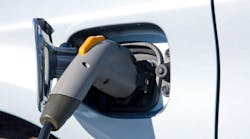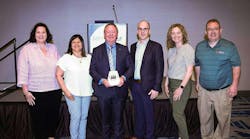Volvo Powertrain Corp. revealed how a newly designed diesel engine will meet upcoming EPA '07 emissions regulations for U.S. trucks during a news conference held at its Gothenburg, Sweden, headquarters last month.
Volvo Powertrain, which supports Volvo, Mack and Renault operations worldwide, will engineer different versions of the new engine for use in the Class 8 models of the U.S.-based sister OEMs, Volvo Trucks North America (VTNA) and Mack Trucks Inc., owned by parent AB Volvo of Sweden.
Anthony Greszler, vp-engineering of Volvo Powertrain, stated that many options were researched before the company determined what technology will make up its EPA '07 solution.
Greszler said the technology selected to meet the next round of emissions regs will include:
-
A “high-efficiency” cooled EGR (CEGR) system will provide NOx control
-
A “catalyzed” DPF (diesel particulate filter) with active regeneration and an internal oxidation catalyst will provide particulate control
-
Closed crankcase ventilation Describing Volvo Powertrain's overall approach to engine emissions as one of “technological evolution from ‘02 to ‘10,” Greszler noted the EPA '07 engine will be “facilitated” by low-sulfur diesel fuel.”
Greszler said other key engine features will include:
-
Advanced high-pressure fuel injection system capable of multiple injections per stroke
-
Single-stage variable geometry turbocharger
-
High-capacity cooling systems, fully integrated with each truck model
-
DPF integrated with truck exhaust system
-
Onboard diagnostics
Greszler described Volvo Powertrain's '07 engine as a “high-performance EGR” unit that is expected to deliver fuel consumption “comparable” to current Volvo-brand engines. He said the burning of low-sulfur fuel in the more combustion-efficient '07 engine will “let us extend drain intervals for '07.”
Greszler noted that servicing the DPF, which he said functions like “a mini furnace,” will require removing ash buildup after about 150,000 miles or 4500 hours.
He said the expectation is the DPF could simply be exchanged at that interval in a procedure that would take about as long as a typical oil change and “cost about $150.”
According to Volvo, it has 35 trucks equipped with '07-compliant engines running as test vehicles in U.S. fleet operations. It also stated that its DPF experience includes 450 trucks that have clocked over 23-million miles trucking around Europe so far.
Blocks for the new powerplant will be cast as they are for today's Volvos at the company's foundry in Skovde (pronounced “shuffda”), Sweden.
Partially built-up engines will be shipped from a Skovde plant for final assembly at the Volvo Powertrain plant in Hagerstown, MD.
The Hagerstown plant, which has been building Mack engines since 1961, is now being converted to what Volvo terms “the North American Center of Excellence for powertrain operations of the Volvo Group.” Along with Mack engines, the plant will also be producing Volvo engines beginning next year.
Lars-Goran Moberg, president & CEO of Volvo Powertrain, said the investment in Hagerstown means “the demanding customers in this market can expect industry-leading quality and performance for years to come.”
Roger Johnston, vp & Hagerstown plant manager, told FLEET OWNER that much could be done with the planned '07 engine to “tune” it to meet the performance and operating expectations of both Volvo and Mack customers in the U.S. and Canada.


